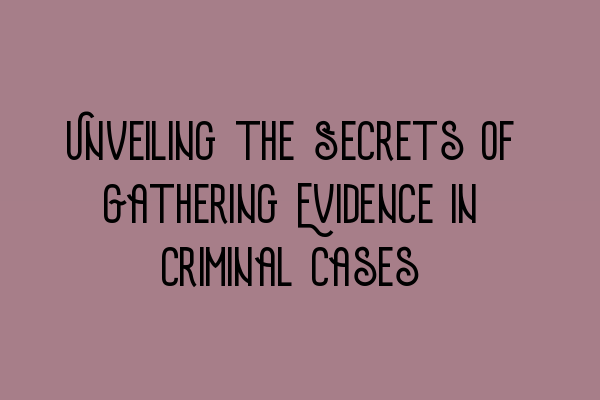Unveiling the Secrets of Gathering Evidence in Criminal Cases
As criminal law solicitors at SQE Criminal Law & Practice Law UK, we understand the critical role that evidence plays in shaping the outcome of a criminal case. Building a strong case relies heavily on the ability to gather and present evidence effectively. In this blog post, we will delve into the secrets of gathering evidence in criminal cases, equipping you with the knowledge you need to navigate the complexities of the legal system.
1. The Importance of Evidence in Criminal Cases
In a criminal case, evidence serves as the foundation on which both the prosecution and defense build their arguments. It plays a pivotal role in establishing guilt or innocence, determining the credibility of witnesses, and ultimately shaping the verdict. Every piece of evidence presents an opportunity to uncover the truth and ensure a fair trial.
2. Types of Evidence in Criminal Cases
Evidence in criminal cases can take various forms, including:
– Direct evidence: This includes eyewitness testimony, video footage, photographs, documents, or any piece of evidence that directly proves or disproves a fact in question.
– Circumstantial evidence: Unlike direct evidence, circumstantial evidence relies on inference and probabilities. It involves establishing a chain of events or circumstances that, when combined, lead to a logical conclusion.
– Expert evidence: In complex cases, expert witnesses with specialized knowledge can offer valuable insights. Their opinions and interpretations can help the court understand technical details and complex matters that are beyond the scope of a layperson’s understanding.
– Character evidence: This type of evidence provides insight into a defendant’s character, helping the court determine if the accused is capable of committing the alleged crime.
3. Gathering Evidence: The Initial Steps
As solicitors, we know that the early stages of an investigation are crucial for gathering evidence. Here are some key steps to kickstart the process:
a) Preservation: Ensuring the preservation of potential evidence is vital. This includes securing crime scenes, collecting physical evidence, and preserving electronic evidence such as phone records or CCTV footage.
b) Witness interviews: Interviewing witnesses while events are still fresh in their minds can provide crucial information. Witnesses’ statements can strengthen or weaken the prosecution or defense’s case.
c) Gathering documentary evidence: Documents such as medical reports, financial records, or contracts can provide essential insights, supporting the case strategy.
4. Admissibility of Evidence
Even if evidence appears to be significant, it must meet certain legal requirements to be admissible in court. Solicitors must carefully assess the admissibility of each piece of evidence to avoid any legal pitfalls. Common factors affecting admissibility include relevance, reliability, fairness, and the manner in which the evidence was obtained.
5. The Role of Technology in Evidence Gathering
Technological advancements have revolutionized the way evidence is gathered and presented in court. Digital evidence, such as social media posts, emails, or electronic transactions, can provide valuable insights into a suspect’s activities. However, proper procedures must be followed when collecting and presenting digital evidence to ensure its admissibility.
6. The Importance of Expert Witnesses
In complex criminal cases, expert witnesses play a critical role in explaining technical or scientific evidence to the court. These experts help bridge the knowledge gap and assist judges and jurors in understanding complex concepts. Engaging reputable and qualified expert witnesses is pivotal to ensure a fair and informed trial.
7. Collaboration and Legal Strategy
Collaboration between solicitors, barristers, and experts is essential in developing a robust legal strategy. Through systematic analysis and evaluation of evidence, legal professionals can identify strengths and weaknesses, design cross-examination strategies, and construct a comprehensive case that best serves their client’s interests.
8. The Evolving Landscape of Evidence Gathering
The world of evidence gathering is continuously evolving, with emerging technologies and legal precedents shaping its trajectory. As solicitors and legal professionals, it is crucial to remain up-to-date with these developments to navigate the challenges they may present and leverage new opportunities they may offer.
Conclusion
Gathering evidence in criminal cases is an intricate process that demands acumen, vigilance, and attention to detail. By understanding the importance of evidence, the different types available, and following best practices, solicitors can build strong cases, ensuring justice is served. At SQE Criminal Law & Practice Law UK, we are committed to guiding our clients through this journey, leveraging our expertise and experience. Contact us today for comprehensive assistance in all criminal law matters.
